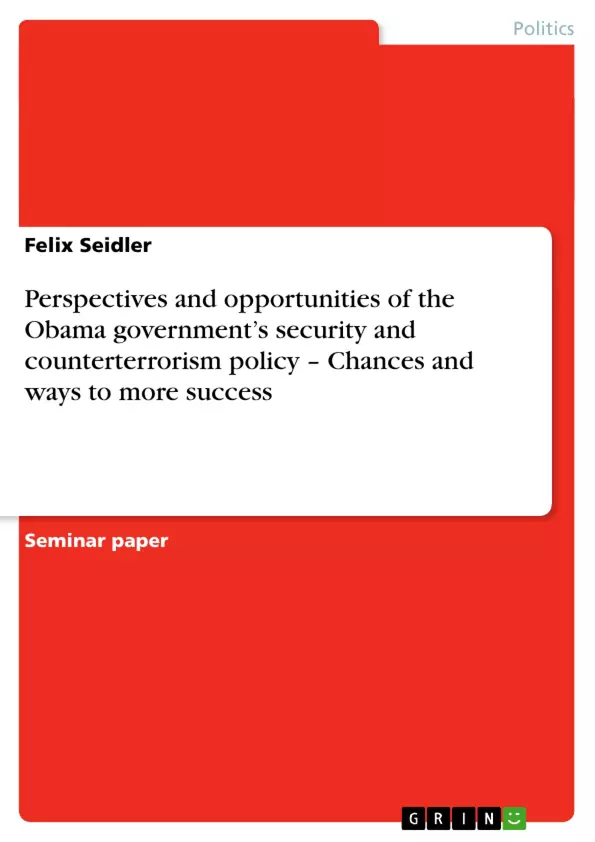On the 20th of January 2009 Barack Obama was inaugurated as the 44th president of the United States of America. This seminar paper deals about the perspectives and opportunities the new president and his government have in security and counterterrorism policy. In the past years these two fields of policy have had a dominant role in the whole US policy. One can expect despite the difficult situation of US economy this status will remain.
In consequence the paper’s aim is to find out how the Obama government may be able to run a more successful security and counterterrorism policy than the Bush government. For this case an evaluation of the former administrations policy is necessary here. The evaluation will point out the failures of the Bush government and offer the tasks for the future policy guidelines. It will be Barack Obama´s challenge to correct the mistakes of his precursor. In addition to this he has to face the global threats with his own security and counterterrorism policy. Of course Obama knows about his future work in these cases. In his campaign program he offered different statements and solutions for security and counterterrorism policy tasks. An introduction and analysis of the program will provide the informative basis for naming the perspectives and opportunities. The analysis will be completed by an estimate for the policy options and own suggestions on facing the two policy areas.
Of course the national and the global economy will have a high priority for Barack Obama. But not only by the cases Afghanistan and Iraq security and counterterrorism policy will be a high-class topic for the new administration. The international community has high expectations on Barack Obama´s policy. George W. Bush has left his successor a mostly negative reputation in the world. The double challenge on Barack Obama will be to rebuild the global reputation of USA by concurrently making security policy and fighting terrorism. The question is if Obama will be able to handle the balancing act of rebuilding the reputation and fighting terrorism.
Obama has to find a coherent policy, which brings all the mentioned topics together. In chapter 3 the paper will name and evaluate ways to realize the balancing act into concrete policy. The next years will be asking for many important decisions. Iraq, Iran, Afghanistan, Al-Qaeda, Israel/Palestine and a lot more crisis issues call for answers by US security and counterterrorism policy.
Inhaltsverzeichnis (Table of Contents)
- Introduction
- Evaluation of the Bush administration
- The program of the Obama administration
- Barack Obama
- Cabinet members
- The policy shifts: chances and ways
- Security policy
- Counterterrorism policy
- Further perspectives, opportunities, suggestions
Zielsetzung und Themenschwerpunkte (Objectives and Key Themes)
This seminar paper aims to analyze the prospects and opportunities for a more successful security and counterterrorism policy under the Obama administration, compared to its predecessor. It evaluates the Bush administration's policy failures to identify tasks for future guidelines, examines Obama's campaign program, and proposes policy options and suggestions.
- Evaluation of the Bush administration's security and counterterrorism policies and their shortcomings.
- Analysis of Barack Obama's campaign promises and policy proposals regarding security and counterterrorism.
- Identification of potential policy shifts and their implications for US foreign policy.
- Exploration of opportunities for a more successful approach to security and counterterrorism.
- Assessment of the challenges faced by the Obama administration in balancing reputation rebuilding with counterterrorism efforts.
Zusammenfassung der Kapitel (Chapter Summaries)
The Introduction sets the context by highlighting the significance of security and counterterrorism policy in US foreign relations and outlining the paper's objective: to assess how the Obama administration could improve upon the Bush administration's approach. The chapter emphasizes the need for a balanced approach that considers both the global reputation of the US and the ongoing fight against terrorism.
The chapter on the Evaluation of the Bush administration critiques the Bush administration’s policies, specifically citing the "Global Strike" system and the lack of concrete solutions in the National Security Strategy 2006 regarding the "war on terror." It concludes that the Bush administration's policies mainly failed due to a lack of long-term strategic thinking, leading to a decline in the US global reputation.
The section on The program of the Obama administration begins the analysis of Obama's approach by noting the public debate surrounding the Bush administration's failures and both Obama and McCain's attempts to distance themselves from those policies. It sets the stage for a comparative analysis of the two administrations' approaches.
Schlüsselwörter (Keywords)
US foreign policy, security policy, counterterrorism, Obama administration, Bush administration, global reputation, Iraq War, Al-Qaeda, National Security Strategy, terrorism, democracy promotion.
What is the main goal of Obama's security and counterterrorism policy analysis?
The goal is to identify perspectives and opportunities for the Obama administration to run a more successful policy than the previous Bush administration.
What were the identified failures of the Bush administration?
Failures included a lack of long-term strategic thinking, the "Global Strike" system, and a decline in the global reputation of the USA.
What challenge did Obama face regarding the US global reputation?
Obama had to perform a "balancing act" between rebuilding the nation's reputation and effectively fighting global terrorism.
Which crisis issues required answers from the new administration?
Key issues included the wars in Iraq and Afghanistan, relations with Iran, the threat of Al-Qaeda, and the Israel/Palestine conflict.
Did Obama have a specific program for counterterrorism?
Yes, his campaign program offered various statements and solutions which are analyzed in the paper to provide a basis for policy options.
How important was the international community's expectation?
The expectations were very high, as the world looked for a coherent policy that moved away from the controversial strategies of the previous years.



